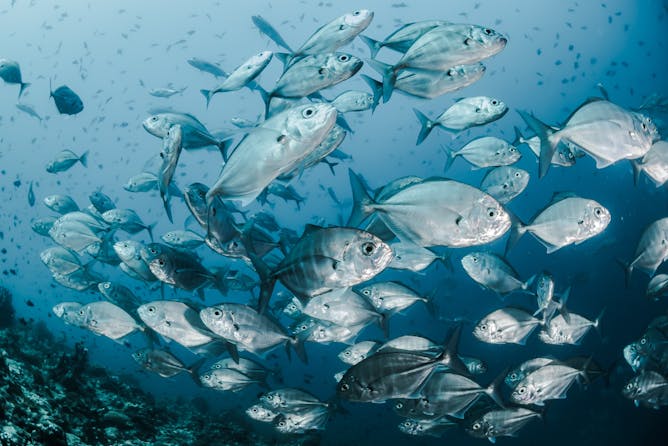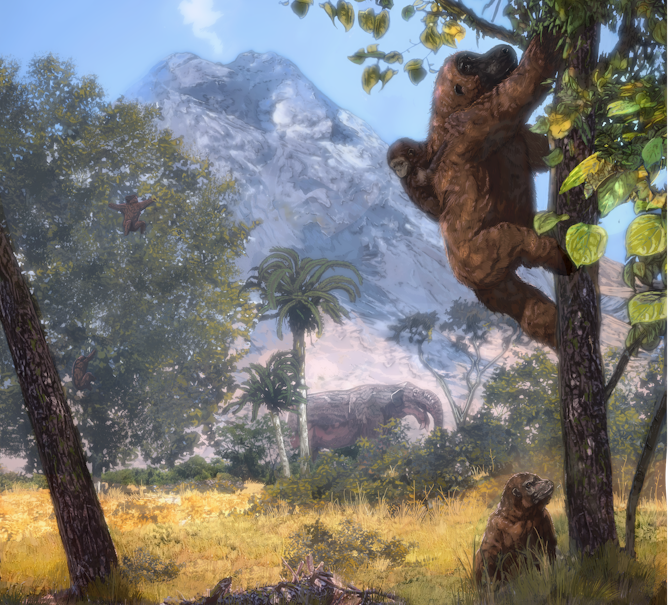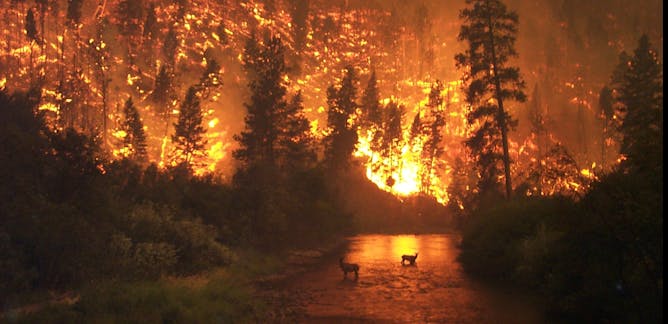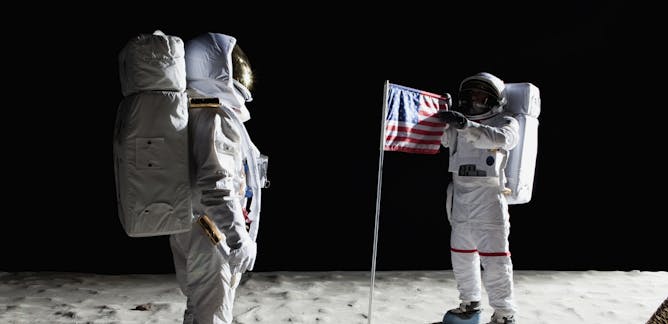|
|
|
|
A number of recent forecasts point to the arrival of El Niño conditions this year, which would have wide repercussions on weather and, as climate scientist Dillon Amaya explains, on ocean life. “In the climate system, El Niño is king. When it dons its fiery crown, the entire planet takes notice, and the oceans are no exception,” he writes, providing an excellent explanation for how this key climate pattern forms.
A study published last week offers a new interpretation of ape and human evolution by recreating the environmental conditions in Africa millions of years ago and combining that information with fossil records. The researchers found that grasslands emerged earlier than previously believed and played a crucial role in development of the first known ape to move with an upright posture. “Because the timing of the assembly of Africa’s grassland habitats underlies many
evolutionary hypotheses, our discovery that they existed much earlier than expected calls for a recalibration of those ideas,” they write.
One of the biggest environmental stories this year is the rain and snow that have pummeled California. Chad Hecht, meteorologist from Center for Western Weather and Water Extremes at the University of California San Diego’s Scripps Institution of Oceanography, explains the wide-ranging impact, including potential flooding, from this very wet year. Last week, the federal government released a proposal to allocate Colorado River water rights, which western states have not been able to resolve; another article draws from our archive to understand what’s at stake.
While this Saturday is Earth Day, The Conversation is covering environmental issues like these all year round.
Also in this week science news:
If there’s a subject you’d like our team of science editors to investigate, please reply to this email.
|

|
Martin La Monica
Director of Editorial Projects and Newsletters
|
|

Marine heat waves can reach the ocean floor as well as surface waters.
Sebastian Pena Lambarri via Unsplash
Dillon Amaya, National Oceanic and Atmospheric Administration
El Niño can trigger intense and widespread periods of extreme ocean warming known as marine heat waves. They can devastate marine life.
|

An ape that lived 21 million years ago was used to a habitat that was both grassy and wooded.
Corbin Rainbolt
Laura M. MacLatchy, University of Michigan; Dan Peppe, Baylor University; Kieran McNulty, University of Minnesota
Contrary to the idea that apes evolved their upright posture to reach for fruit in the forest canopy, the earliest known ape with this stature, Morotopithecus, lived in more open grassy environments.
|

Psilocybin and other psychedelics could help patients process the challenges of a cancer diagnosis.
Kateryna Kon/Science Photo Library via Getty Images
C. Michael White, University of Connecticut
Receiving a cancer diagnosis and undergoing cancer treatment can be a traumatizing experience. Psychedelics like LSD, psilocybin and MDMA could help alleviate symptoms from cancer-related PTSD.
|
|
|

Mohammad Reza Alizadeh, Massachusetts Institute of Technology (MIT); Mojtaba Sadegh, Boise State University
Fires here can affect meltwater timing and water quality, worsen erosion that triggers mudslides, and much more, as two scientists explain.
| |

Eric Smalley, The Conversation
Generative AI can seem like magic, which makes it both enticing and frightening. Scholars are helping society come to grips with the potential benefits and harms.
|

Shichun Huang, University of Tennessee
The Earth isn’t permanent, but it was here for four billion years before humans arrived and should be here for several billion more.
| |

Svetla Ben-Itzhak, Air University
China has invested massively in its space capabilities in recent years and is now a major competitor with the US. But according to a space policy expert, the US still dominates space by most measures.
|

Ramana Vinjamuri, University of Maryland, Baltimore County
Robots are already carrying out tasks in clinics, classrooms and warehouses. Designing robots that are more receptive to human needs could help make them more useful in many contexts.
| |

Sayonnha Mandal, University of Nebraska Omaha
Passwords are both annoying to use and vulnerable to hackers. Fortunately, big tech is moving to support stronger, easier-to-use passkeys.
|
|
|
|
|
-
Joseph Stover, Gonzaga University
It’s not entirely accurate to say that you’re more likely to die in a car accident than in a plane crash. Chances are, you’re not the average person.
-
Ziv E. Cohen, Cornell University
Postpartum depression can strike days, weeks or months after delivery, and the much rarer cases of psychosis can be difficult to detect.
-
Amie Ashcraft, West Virginia University
The increase in abortion restrictions may also lead to a decline in access to emergency contraceptives.
-
Jennifer Weeks, The Conversation
Two decades of drought have reduced the river’s flow by one-third compared to historical averages. The Biden administration is considering mandatory cuts to some states’ water allocations.
-
Chad Hecht, University of California, San Diego
This year’s Sierra snowpack is looking a lot like 1983’s, and that was a year of flooding and mudslide disasters. A meteorologist explains what’s ahead.
-
Nicholas Dagen Bloom, Hunter College
Everyone likes getting something for nothing, but history shows why the math behind free public transit doesn’t add up.
|
|
|
| | |
| | |
| |
| |
| |
|
|
|